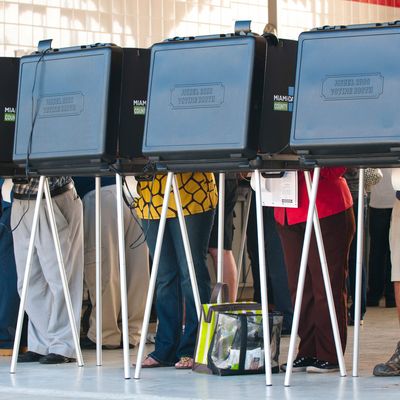
In an atmosphere poisoned by Donald Trump’s constant claims that the presidential election has been or will soon be “stolen,” there are actually some real threats to the integrity of our voting system worth worrying about between now and November 8.
These do not include the “massive voter fraud” chestnut far too many Republicans love to talk about in one of the more obvious racial dog whistles of this and other recent campaigns. Such talk could, as is now increasingly feared, generate very real election-day violence as voters in heavily Democratic areas encounter Trump campaign and GOP “monitoring” activities perceived as acts of intimidation or suppression.
But above and beyond these campaign-generated disruptions, our rickety and radically decentralized system for casting, recording, and reporting votes — not much improved since the 2000 fiasco — could fail us or prove an irresistible target for malicious hackers, domestic or foreign.
Even if we did not have reason to fear hackers with Trump stickers in Cyrillic characters on their laptop lids, things could get weird when it comes time for the far-flung precincts and county election offices that comprise the soft underbelly of democracy to perform their essential functions. That is especially true of those jurisdictions that thought they were placing themselves on the cutting edge of election technology a decade or so ago by buying electronic voting machines, as Lauren Smiley, writing in The New Republic, explains:
Many of the country’s 8,000 voting jurisdictions still rely on antiquated machines, and the problems have only escalated as the machines have grown older. According to a report from the Brennan Center for Justice at New York University, 43 states will use electronic voting machines this November that are at least 10 years old—and they exhibit all the issues you’d expect from decade-old computers …
Perhaps most troubling is the fact that voters in 14 states—including battleground areas in Pennsylvania and Virginia—will cast their ballots this year on electronic machines that do not provide paper copies of the votes. That means there will be no way to audit the results should something go wrong.
Worse yet, there will be no way in those jurisdictions to confirm or deny suspicions of hinky returns. And it’s the hacker factor that could make those suspicions run wild.
It’s now clearly established that someone hacked voter-registration databases in Arizona and Illinois during the primary season. No one is sure, however, whether said hackers were testing the vulnerability of election-related systems or just wanted some rich personal data from one or both states. But it was worrisome in either event.
Some experts believe the primitivism of our election infrastructure is, ironically, a feature rather than a bug in terms of its vulnerability to hackers:
“Nobody is going to be able to change the outcome of the presidential vote by hacking voting machines. The system is too distributed, too decentralized, too many implementations for any individual actor or group to make substantial change,” said Nicholas Weaver, a computer scientist and cybersecurity expert at the International Computer Science Institute at the University of California, Berkeley.
“Yes, they’re horribly insecure, yes, many of them give me nightmares,” he continued, “but the attacker’s not going to be able to change the outcome of the presidential vote that way.”
But even those who are telling us all to chill about the election’s being hacked concede that malicious interference with the system, even on a relatively small scale, can create chaos and uncertainty. And that is why an emerging fear involves the possibility of a hack not of actual votes or even the counting of votes, but of the reporting of votes to media on Election Night. What if somebody messed with those Associated Press reports everybody uses to figure out who has won in particular states and counties? Politico has now raised that particular alarm:
[T]he security community is worried The Associated Press’ army of reporters could get hacked and the wire service — the newsroom that produces the results data on which the entire media world relies — inadvertently starts releasing manipulated election tallies or that cybercriminals penetrate CNN’s internal networks and change Wolf Blitzer’s teleprompter.
This risk is at bottom a temporary one, since AP is only reporting data generated by official sources:
Federal and state officials stress that even a successful hack on a major news outlet around Election Day would not affect the final results, which typically take weeks to certify.
That’s comforting (aside from the aforementioned electronic-machine issues involving votes that cannot entirely be authenticated by a paper trail), until you realize how you’d feel on November 9 if we temporarily cannot be sure what actually happened the day before. And consider this: What if the objective of a certain foreign power is less to elect their favorite U.S. major-party presidential candidate than to reinforce said candidate’s arguments that this country is in such a state of decay and decline that we cannot even hold an honest election?
Yeah, such concerns could make you as jumpy as a Bolshoi ballerina.






























